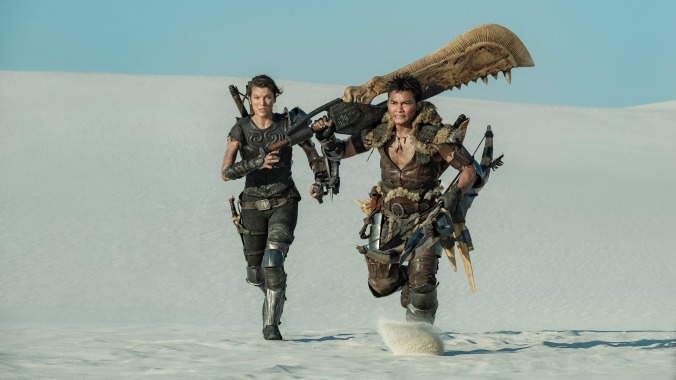Paul W.S. Anderson brings more video game mayhem to the big screen with Monster Hunter


Note: The writer of this review watched Monster Hunter on a digital screener from home. Before making the decision to see it—or any other film—in a movie theater, please consider the health risks involved. Here’s an interview on the matter with scientific experts.
Paul W.S. Anderson, one half (with Milla Jovovich) of the power-couple-slash-brain-trust behind the often irresistible and reliably not-screened-for-critics Resident Evil films, has found himself a literal sandbox: About half of his latest video game adaptation, Monster Hunter, takes place in a desert. There’s a couple badass heroes with humongous swords, a few big scaly monstrosities, and frequently not much else. The minimalism is consistent with Anderson’s career-long devotion to delivering caloric content with an unlikely combo of classical unities and pounding, insta-dated electronic beats. The movie’s called Monster Hunter—what more could it reasonably need?
A wildly original plot? Relatable characters? If a viewer can’t identify with the existential need to not get eaten by toothy, fire-breathing megafauna, then all hope is lost. This isn’t to imply that the movie’s source material, the bestselling game series Monster Hunter, is about nothing more than hunting monsters; it is also about crafting items and eating food prepared by bipedal cats, both activities well represented in the film. Anderson’s chief liberty with (or sacrilege against) the source material is his decision to make the protagonist, Lt. Artemis (Jovovich, naturally), a soldier from our own world who gets sucked into the Monster Hunter universe through an interdimensional storm along with the rest of her squad. Is it kind of goofy? Definitely. Is it goofier than the high fantasy setting? No.
Jovovich is our last classic action hero, capable of going toe-to-toe with the greats of the ’80s when it comes to delivering cheesy dialogue with a steely glare. “Flamethrowers?” she says, looking over some charred bodies that might as well come with a blinking neon “Here Be Dragons” sign. “Never seen a flamethrower do this to a man.” In the Resident Evil films, her character wielded two guns; here, she eventually comes to wield two blades. The screen time of her grunt comrades is mercifully brief—they all die within the first 10 minutes. Having established the necessary motivation (monsters), the movie shifts into wasteland survival mode before Artemis crosses paths with The Hunter (Tony Jaa), a local with a personal arsenal of exploding arrows and grappling hooks.
The breathless, fast-forward pace is an Anderson trademark. The budgets of his films may be in the mid-eight-figures but their generic pleasures are those of good old-fashioned B movies. In Monster Hunter, that includes Aliens-riffing claustrophobia (another Anderson specialty) and some terrific giant spiders—it’s been a while since anyone made a decent giant spider movie. As far as themes are concerned, they are mostly chestnuts: evil forces and impromptu solidarities between archetypes faced with the odds. The former is represented by some kind of lost civilization, the latter by the initially antagonistic Artemis-Hunter relationship.
Being a resident of a different reality, The Hunter doesn’t speak English. The communication barrier is probably for the best, as Anderson’s generic dialogue is sub-James Cameron, and his plots have more dimensions than his characters. But there is something going on in these films. In the anti-snob nomenclature invented by the critic Manny Farber, Anderson is unquestionably an industrious, unpretentious “termite.” The monsters in his movies are not metaphors—they are not representatives of some kind of lurking unresolved trauma or of our deeper fears. But there is a certain point at which, say, the Resident Evil films’ plot formula of clones, corporate machinations, and time limits coalesces into some artistic themes.
Of course, there’s a much simpler case to be made for Anderson as having some kind of artistry: If making these movies were easy, more people would be doing it. The global industry has no shortage of wannabe franchise-starters with generic plots, sequel-teasing ancients evils, and digitally animated abominations, but none of them have a fraction of the poise that Anderson brings to any given project. He is a dexterous director of set pieces, with an excellent sense of space and scale that goes a long way when it comes to showdowns with hulking demon things and oversized creepy crawlies or a climactic battle that pits the military-industrial complex against a colossal dragon. (Like the classic tagline of Anderson’s Alien Vs. Predator says, “Whoever wins… we lose.”)
Anderson’s breakthrough, Mortal Kombat, is still the benchmark for infectiously fun video game adaptations. If Monster Hunter is intentionally a more spartan piece of work, its gamer aesthetics and bare minimums, even at their crudest, still feel like an antidote to the lethargic drag of movies with better VFX and cooler trailers. There is something to be said for a film that sets up its entire third act by having Ron Perlman, with full-on console RPG hair, unfurl a map and declare, “I believe that the ancients knew how to travel between both worlds. I believe that is the purpose of the Sky Tower.”